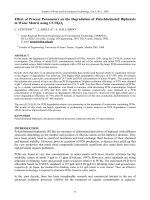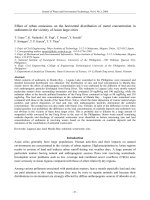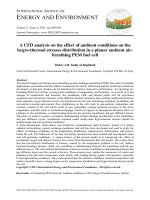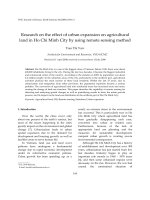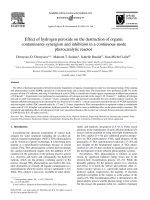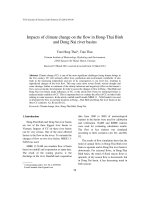EFFECT OF CORONA VIRUS ON THE ECONOMY IN VIETNAM AND FISCAL AND MONETARY POLICY
Bạn đang xem bản rút gọn của tài liệu. Xem và tải ngay bản đầy đủ của tài liệu tại đây (1.05 MB, 13 trang )
EFFECT OF CORONA VIRUS ON THE ECONOMY IN
VIETNAM AND FISCAL AND MONETARY POLICY
I.
Covid-19 status report.
1. Covid-19 Global situation.
Worldwide: confirmed cases 6.393.956; active cases 3.224.023, deaths
383.318, in 215 country. (As of 9h 1 june 2020)
United States with the highest number of confirmed COVID-19 infections.
Map of the COVID-19 outbreak as of 2 June 2020
1,000,000+ Confirmed cases
100,000–999,999 Confirmed cases
10,000–99,999 Confirmed cases
1,000–9,999 Confirmed cases
100–999 Confirmed cases
1–99 Confirmed cases
No confirmed cases, no population, or no data available
COVID-19 Outbreak World Map Total Deaths per Capita
100+ deaths per million inhabitants
10–100 deaths per million inhabitants
1–10 deaths per million inhabitants
0.1–1 deaths per million inhabitants
0.01–0.1 deaths per million inhabitants
No deaths or no data
2. In Vietnam:
As of 4 June 2020, the country had 328
confirmed cases, 302 recoveries, and no deaths.
Map of the COVID-19 pandemic in Vietnam as
of 15 May 2020
Confirmed 1–9
Confirmed 100-499
Confirmed
10-99
How Covid affects Vietnam?
Like most of the world's economy, Vietnam was
hit hard by the outbreak because of the
slowdown of private and national industries, the
downturn of stock exchanges, and the lower number of incoming tourists.
However, Vietnam is expected to be harmed less than China.
After the Vietnamese government ordered a nationwide isolation, many public
areas such as schools and restaurants had to be closed until 15 April 2020.
* Economics
- They also estimated that airlines will lose more than US$1 billion of revenue.
- Vietnam Industry Agency says industry manufacturing processing is in short
supply
of
raw
materials
and
components
(mostly
imported
from Japan, China, South Korea) leads to the risk of stopping many factory
operation.
- Tourism industry is the most severe affected, Civil Aviation Authority of
Vietnam said the aviation industry is in the worst situation in 60 years of
development.
Foreign arrivals to Vietnam fell by 48.8% to 3.7 million in the reviewed period,
the Vietnam General Statistics Office said.
Of the total, 72.9% tourists were from Asia, down 51.4%. The fall was seen in
almost
all
major
markets,
such
as China, Malaysia, South
Korea, Japan and France. Tourism revenue was estimated at VND 8.3 trillion
(US$ 360 million), down 54.1%.
- Department of Housing and Real Estate Market Management of Ministry of
Construction said the price of apartments increased over the same period last
year (Hanoi increased 1.02%, Ho Chi Minh City increased 3.5%), the price of
individual houses increased (Hanoi increased 3.82% , Ho Chi Minh City
increased by 8.36%); while business premises rents decreased by 10-30%, real
estate businesses reduced staffing by 50% compared to the time before the
pandemic, 80% of real estate floors nationwide stopped operating. [305] Owners
of rental business premises actively reduced 30% -40% of the price compared to
the same period last year
Stores across Vietnam quickly sold out of surgical
sanitisers after the initial cases of coronavirus were reported.
masks and hand
Interim Health Minister Vũ Đức Đam urged the public to remain calm during
the outbreak and avoid excessive emergency shopping. Vietnamese authorities
also arrested people profiteering from the outbreak.
- The Planning and Investment Ministry has estimated that 250,000 workers will
lose their jobs on first quarter and another 1.5-2 million face a similar threat in
the coming months. The ministry has also warned that if the pandemic situation
worsens, 400,000 would lose their jobs and three million more could be laid off.
- As of May 21, agriculture increased by 0.08% and industrial production
increased by 1.8% over the same period, the number of newly established
enterprises decreased by 13.3% while the number of enterprises stopped doing
business for a definite period increase by 33.6%.
=> Economic growth is considered to be the worst since Doi Moi in 1986
- The Ministry of Planning and Investment published the survey results in
April, which showed that 86% of nearly 130,000 enterprises were negatively
affected due to Disease.
- Ministry of Industry and Trade reported exports of US $ 8.22 billion in the
first two weeks of May, considered to be the lowest turnover period since the
beginning of 2020 to the present, the main export group (phones). , machinery
and equipment) plummeted.
(The Vietnam General Statistics Office said export turnover reached US$99.36
billion, down 1.7% year-on-year. Meanwhile, import value reached US$97.48
billion, down 3%, Vietnam's exports to the EU and ASEAN fell 12% and
13.4%.)
* Sport and Sports TV
2020 V.League 1 to be delayed to 7 March until further announcement, which
affected the preparation of Vietnam national football team for the
upcoming 2022 World Cup qualification.
It also caused the Vietnamese Grand Prix of the 2020 Formula One World
Championship to be postponed until further notice.
* Education
Schools and government authorities extended the holiday season until February
10 on a case-by-case basis. On February 14, the Ministry of Health proposed
schools to remain closed until the end of February, at which point schools had
already closed nationwide
The decision to close schools nationwide, as a formality, came with the national
isolation order on March 31, effective April 1.
Vietnamese students have not gone to school this spring semester, but schools
are gradually adopting online teaching. On 31 March, the Ministry of Education
and Training issued a guide of teaching plans for the second semester of the
academic year 2019-2020 for junior high school and high school levels.
* In popular culture
Vietnam's National Institute of Occupational and Environmental Health
commissioned artists to release the song "Ghen Cô Vy" ("Jealous Coronavirus"),
a remake of the 2017 song "Ghen" ("Jealous"), to teach people how to
thoroughly wash their hands during the worldwide coronavirus outbreak. It has
gone viral amidst the coronavirus outbreak, first earning praise from John
Oliver in his talk show Last Week Tonight with John Oliver and has become
increasingly popular among public and frequently duplicated by netizens,
with UNICEF recommending the video as a means of fighting back the fear of
coronavirus.
II. FISCAL POLICY OF VIETNAM
The Minister of Finance Dinh Tien Dung said that in the context of translating
Covid-19 caused many difficulties in production and business activities,
affecting the tax payment obligations of residents, enterprises, the last time, the
Ministry of Finance has implemented many supporting solutions such as: tax
renewal, exemption from a variety of fees, fees, as well as many solutions to
balance the state budget. In particular, the Ministry of Finance has submitted
the government Decree No. 41/2020/ND-CP on the renewal of tax payment and
land rent for subjects influenced by the Covid-19 epidemic. Accordingly,
implementation of the 5-month tax payment deadline for value added tax and
corporate income tax of enterprises, production and business organizations;
Renew for 5 months for value added tax and personal income tax of the
business households; Renew 5 months for land rents of enterprises,
organizations and individuals... It is known that, by estimate, when
implementing this decree, about 740 thousand enterprises, up to 98% of the
active business will benefit from the policy
.
According to economic experts, Decree No. 41/2020/ND-CP (BH dated 8/4)
was promptly issued an important, practical solution to help businesses,
organizations and individuals overcome difficulties before the adverse impact of
the Covid-19 epidemic. In addition, the scope of supporting objects has an
impact covering, dealing with the issue of relation between different
departments in the economy. This is precisely the key point of a fiscal policy
that is used in sync to achieve multi-objectives such as supporting organizations
and individuals, especially the business community in this particularly difficult
period, ensuring the economic stability and national politics.
In addition, the Ministry of Finance has also presented the government and
settled under the exemption of import duties on medical equipment items served
to the prevention of the epidemic; The Government revised Decree No.
122/2016/ND-CP and Decree No. 125/2017/ND-CP and Decree No.
134/2016/ND-CP on the import tax to disassemble difficulties for enterprises
operating footwear field, textile and processing of agricultural and forestry
products, engineering, agriculture, auxiliary industry and automobile industry.
At the same time, the Ministry of Finance has presented the Government to
propose to the National Assembly at the coming meeting of the decision on the
implementation level of enterprise income tax policy for small and medium
enterprises, applied from 1/7/2020. If this policy is adopted, about 700 thousand
enterprises, accounting for about 93% of the total number of active countries
will benefit. Thereby, the obligation to file the 2020 budget by the number of
enterprises decreased about 7.8 trillion. The Ministry of Finance also presented
the Government to the National Assembly to raise the price reduction of
personal income tax. If this policy is adopted, the total number of workers '
incomes is retained for further increase for spending due to this adjustment in
the year 2020 is about 10.3 trillion.
Last time, the Ministry of Finance has collaborated with the industry to
scrutinize cuts, waiver of various fees and fees. Specific: free of charge for
cooperatives, cooperative associations operating in the field of agriculture and
enterprise, household, personal establishment new in the first year; 70%
reduction in corporate registration fee rate; 67% reduction in corporate
disclosure fee; 50-70% discount on revised grant fee, supplementary postal
license... The total fees and cuts that the business and people benefit from are
about VND 500 billion. Ministry of Finance has also issued circular adjustments
from 10-50% for 9 service groups and exemp-fully exempt from the price of 6
service groups in the securities sector, applied in stock exchanges and Vietnam
Securities depository. This policy has a very good impact on the Vietnam
securities market.
According to the analysis of economic experts, the fiscal policy has been solved
the urgent issues before the eyes, both solving problems for the long term,
creating favorable conditions for the environment of business investment,
production development.
Therefore, the Ministry of Finance has counsels with the government and the
grants authorities the policy to be issued right before the eyes as well as policies
on long-term to disassemble difficulties for people and businesses, development
of production and business is a timely effort, efficiency is remarkable. To date,
these policies have received the agreement, highly appreciated by experts, the
business community and people.
Fiscal Policy team – "Lifebuoy" for the post-19 business community
• Renewal of term of tax payment, land lease
• Small and super Small business income tax reduction
• Exemption from use of agricultural land
• Increase the deduction of individual income tax reductions thereby
reducing tax obligations to the residents.
III.
MONETARY POLICY OF VIETNAM
In early March 2020, the support package was worth over 280.000 billion dong
(255.000 billion dong with bank credit support and 30.000 billion dong of tax
support.)
The cause must have support package:
• Fistly, Due to the Covid-19 translation influence, the supply chain was
broken in Chinese link while there were no fewer sectors of
manufacturing business in Vietnam depending on 70-80% of material
sources from China. This is a late mineral-money shock.
• Second, due to the influence of the Covid-19 epidemic, the tourism
market is not brake, moreover, the most heavily influenced countries of
translation are the top tourist markets in Vietnam. The tourism industry is
most heavily influenced and has a wide range of related fields such as
passenger transport, out-of-family dining, entertainment,...
• Thirdly, the following shock bow is a bridge shock when Vietnam's
export market is narrowed and most FDI enterprises are in the global
value chain which is severely disrupted.
• Fourth, due to Covid-19, the consumer belief in a double drop with
temporary unemployment and reduced income should the domestic
consumption market shrank.
Therefore, support packages are necessary but must be the right
audience and based on market principles.
Group Policy priority when the epidemic is controlled it is:
(i)
promptly remove the restriction on the supply
(ii) support capital recovered by the business
(iii) stimulus to create motivation for the extended aggregate supply. At
the same time, each step restores the fiscal discipline (which is
loosened during the epidemic) to ensure the sustainability of the
budget over the long term.
Monetary policy can assist through the State Bank (NHNN) to support
commercial banks to restructure existing debts to the clients (reducing interest
rates on current debts, debt reversal..); Discount in non-business period without
revenue. Depending on financial health, each bank will have a different loan
discount of 0.5%-3% per year or no penalty calculation for deferred loans.
When the epidemic is under control, monetary policy must play a decisive role
in providing the necessary capital to help the business recover from the
production. The point of note is that the activity of credit institutions depends
on the line of capital lending out and the capital return of the business. In the
period of the epidemic, businesses will have difficulties to maintain the flow of
capital returned to credit institutions in the short term. Even if the epidemic is
under control, businesses also need time to recover their ability to repay.
During this period, some credit institutions may be deficient in liquidity due to a
flow of capital returned to congestion. The State bank should be willing to
provide timely liquidity to credit institutions. When the production-business
activities are restored to normal the State Bank will withdraw these funds to
control inflation does not rise too high. The funds will aim to "lubricate" to help
the gears in the economy-the company operates. Although banks ' profits may
be reduced, they also retain liquidity.
• For example: Vietnam Airlines, since outbreak, air freight demand is
significantly reduced. This business has been reduced by 1% interest rate
from the beginning of February.
In essence, the credit package of 250,000 billion will be the synthesis of the
current balance of commercial banks (NHTM) which will support the affected
enterprises in the form of restructuring the loan term, reducing interest and fees.
250,000 billion this is not a new money to be pumped into the economy in the
form of new loans or new credits. It is not an economic stimulus package nor is
the form of monetary expansion.
Part of this package will be new loans will also enjoy lower interest rates under
this advocate. However, these new loans will still be in control of the total
balance limit for the economy.
The ability to absorb new business capital in today's context and the risk of
inflation are arguments that reinforce the argument that the 250,000 billion is
not the new amount to be pumped into the economy. This is a share between the
bank and the business. It will not be the same form as the previous economic
stimulus package when the budget is used to aid interest. With this form, there
will be no single bronze from the budget or from the central bank being pumped
out. It's still the ones located in the current money supply. Thus the market may
believe that this support package will not cause network pressure to inflation in
the short term.
However, the market also needs to observe the durability of commercial banks,
and on the scale of the loans are restructured, on the decline in profits of the
banks, on the risk of the increase in the unclaimed debt in the banking system in
the medium term.
In order for businesses to have immediate access to these support
packages, what will be the key point?
Delayed, delayed payment of taxes, social insurance, health insurance, or a
series of reduced fees and charges can be implemented immediately, because
this is within the Government's reach.
However, for reducing interest rates, fees, restructuring the loans of businesses
of commercial banks, it will still depend on markets where the government can
not intervene too deeply.
Reducing interest rates, fees or allowing loan restructuring will depend on the
decisions and implementation of commercial banks, which are also businesses
and must also take into account the relevant and safe risks in operation process
and regulations on credit, safety in banking activities.
In the current context, commercial banks are motivated to reduce interest rates,
fees and restructure loans for businesses for the benefit of the entire economy
and the banks themselves.
But banks will also have to balance their liquidity, solvency, financial balances,
the risks associated with loan restructuring, and their strength in Participation in
these support packages before making a decision on the size of the support
package and the level of participation.
Thus, for this credit support package, the key point will depend on the
calculations and decisions of commercial banks themselves.
For the credit support package of about VND 250,000 billion, this is the total of
packages that about 10 credit institutions (CIs) have committed to new loans
with lower interest rates and more incentives (from 0.5 - 1.5% / year) compared
to normal credit. The total number of credit packages is likely to be more with
more banks involved.
According to TS. Can Van Luc, this credit package has 4 main
characteristics:
(i) The purpose is to provide new loans to businesses or households
affected by the Covid-19 epidemic (liquidity support, working capital
needs, etc.);
(ii) the main source of these packages is deposits from people and
businesses (not capital from the State budget);
(iii) the mechanism, process of lending is basically the same as a normal
commercial loan, the responsibility of borrowing - paying is purely
between the credit institution and the borrower (the difference is that the
procedure will need to be faster, more flexibility, more favorable interest
rates - depending on the project, the borrower);
(iv) focus on lending to priority areas, areas affected by Covid-19
epidemic.
The above amount, if disbursed, will certainly be included in the credit growth
limit of credit institutions (if disbursed fully or possibly more, it will only
account for 25-30% of the total new loan amount in 2020, so not concerned
about inflationary pressures). The amount of money reduced by applying this
preferential interest rate will reduce the profit of credit institutions. It should be
emphasized further that lending depends on the ability of the economy to absorb
capital. In order to implement this package, it is necessary to have specific
guidance of the State Bank (SBV) on basic credit conditions and specific
industries, sectors and borrowers.
